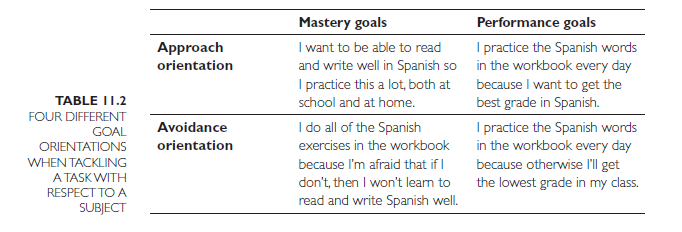a response to the chapter in Kirschner, P. A., & Hendrick, C. (2020). How Learning Happens: Seminal Works in Educational Psychology and What They Mean in Practice. Routledge
This is the last of the chapters in section two ‘prerequisites for learning’ and (a) it overlaps a lot with the Dweck ideas in chapter 9, but (b) comments they make at the end of this chapter make me want to read some of the later sections (fortunately, as in the last chapter or two in this section and the same in some chapters in the first section ‘how does our brain work?’, we seem to be covering some overlapping ground. I guess they are just being thorough, but it makes it harder to keep the ideas straight).
Dweck talked about mastery goals (wanting to be able to do something well) and performance goals (wanting to be able to get specific grades or outcomes in relation to others).
The article they focus on is by Pintrich and he split this further splitting both of these into approach orientation and avoidance orientation.

Pintrich points out that
- You might vary across this matrix according to subject or context. These are not labels to be attached to a person, but rather to a person’s behaviour with regard to one area
- You can combine them e.g. wanting to increase your own capacity to do something while also taking pleasure in scoring well.
They repeat from chapter nine the idea that mastery goal learners just enjoy things more than performance goal learners (kind of the opposite of a vicious circle where the pleasure of learning spurs you on to greater things) and also that the performance goal learners tend to choose superficial strategies to try and achieve ends (strategies which may or may not work).
But they note that as long as both are the approach orientation then mastery and performance goal learners can achieve the same level of outcome, but the mastery goal learners having enjoyed it more are more likely to go on further.
They also note that while the two different orientations (approach and avoidance) don’t make a huge difference for someone more mastery goal oriented, there are significantly less effective outcomes for those who are in the performance goal avoidance orientation corner. This is due to choosing things they think they will be able to do well (fear of failure) so not challenging themselves and so not learning. It is also partly as a result of giving up if things don’t go well rather than trying to find a different approach.
The Pintrich article is not a comfortable read, but the idea paper by Svinicki that they recommend as further reading is a nice overview of the whole with a much more practical bent.
There is a particularly nice chunk in this on page four :
First of all, teachers should focus on wrong answers not as failures, but more accurately as misunderstandings. No student sets out to give a wrong answer; as far as they’re concerned, they’re giving a correct answer. They may just be answering a different question. So instructors should take errors as “teachable moments,” opportunities for learning to occur, and react accordingly. That provides students with a different model of how to react to mistakes with renewed determination to understand rather than with resistance or frustration. The same opportunities present themselves when instructors make mistakes. These, too, are teachable moments. They give the instructor an opportunity to model how to cope with a mistake in a positive way rather than becoming defensive and annoyed.
As to applying this in class, again there is a lot of overlap with chapter nine.
- Encourage risk taking (writes she who tries to cheer Module Two course participants on to do focuses that are novel with very varied results. Some take up the challenge with zest and some as soon as they realise their idea is not following a well worn path, back off and look for something that does).
- Don’t react negatively to ‘failure’ or mistakes.
- Encourage collaborative work not a competitive atmosphere.
- Model the behaviours you want. So again coming back to a ‘we are all in this together’ teaching approach, rather than an ‘I know and will now impart that knowledge to you’ approach. Perhaps even the simple tenet that if you are enjoying it all they may well too, but if you aren’t they definitely won’t.
Pintrich, P. R. (2000). Multiple Goals, Multiple Pathways: The Role Of Goal Orientation In Learning And Achievement. Journal Of Educational Psychology, 92, 544–555
Svinicki, M. D. (2005). Student Goal Orientation, Motivation, And Learning. Idea Paper #41. Manhattan, Ka: The Idea Center.